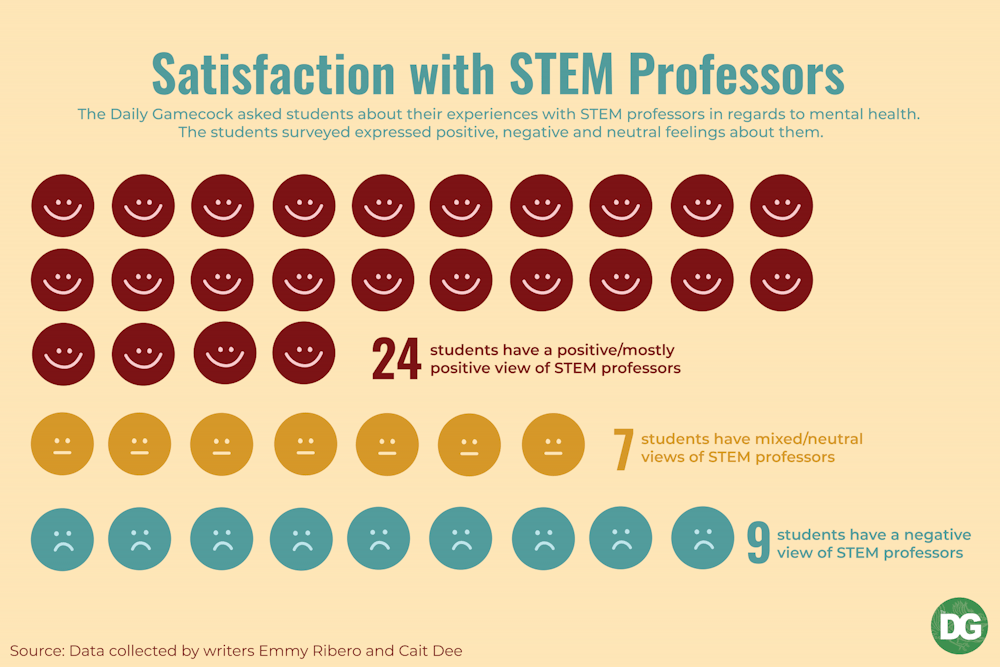The Daily Gamecock spoke with 40 STEM students to see how their professors handle students' mental health. Among these students, The Daily Gamecock found that they have differing opinions on these professors: Some felt that STEM professors added to their stress, making current struggles even more difficult, while others had positive feelings towards their professors.
Out of the 40 students surveyed, 24 reported having positive or mostly positive experiences. Students like third-year biomedical engineering student Anthony Gilles said reaching out and forming relationships with professors has helped them succeed in this field.
"I find most of them are very willing to help students academically," Gilles said. "If you really get to know them personally ... they can talk to you about how to spend your days and optimize your time and manage your work life."
Kate Walbridge, a first-year biology and Spanish student, said that her mental health was impacted by the rigor of her classes. However, her professors responding to her requests for help made a positive impact on her experience.
“I’ve always struggled with chemistry, and it gave me a lot of anxiety, but my professor from last semester did a really good job of making sure that she was open to helping me,” Walbridge said.
Other students felt that their STEM professor's policies are merely an understandable, expectable aspect of the field because of how rigorous STEM majors can be.
“They could be more understanding, but (with) STEM, in general, you have to be more strict in a sense. So, they’re a lot less lenient than maybe humanities professors, but that’s part of what you’re signing up for,” fourth-year chemistry student Kristen Pazder said.
Other students said their STEM professors are not as lenient when it comes to personal issues that arise without warning.
“I feel like my STEM professors are not quite as understanding when I have personal things come up, whether it be mental health issues or, honestly, anything that cannot be proven with a quick trip to the health clinic," second-year computer science student Rae Jones said. "I've even had professors try to ignore the excused absence policies here where they said that they have a limit to how many excused absences that they accept.”

Though few professors actively try to complicate things for their students, many of their policies may make certain tasks more difficult, according to third-year marine science student Ashleigh Griffin.
“I feel like with some of the professors, they may not directly try to be impacting (students') mental health, but they’re definitely not very understanding. I have a professor right now who doesn't take any extensions or late work at all, which is understandable, but he could even go so far as to say, 'Even if there's a death in the family, no matter what happens to you, I don't take any work or extensions,'” Griffin said.
Students also voiced their concerns about accommodations being difficult to obtain when they have sudden mental health issues.
“It can be difficult because a lot of professors won't do accommodations outside of the Student Disability Center,” fourth-year biology student Gemesis Childress said. “It can be kind of hard to get accommodations in the middle of the semester, for example, without having to go to a psychiatrist to get the forms filled out and register with the Student Disability Center.”
Mohamed Atta, a fourth-year mechanical engineering student, said he has had trouble with his professors being condescending.
"Whenever I went to (office hours), (my professor) was like, 'Oh my god, you can't do that? You can't do this stuff? This is like basic maths. How are you going to graduate (or) be in engineering if you don't know how to do this?'" Atta said.
Whether they spoke positively or negatively about their STEM professors, students generally requested that professors be more tolerant and accessible with their policies.
"I think teachers need to just be aware or ... open with their policies, which once again, most of my professors have been, but also understand that not everyone has the ability to get registered because that means getting a diagnosis, which has its own challenges," Saanvi Somani, a second-year biochemistry and global studies student, said.

